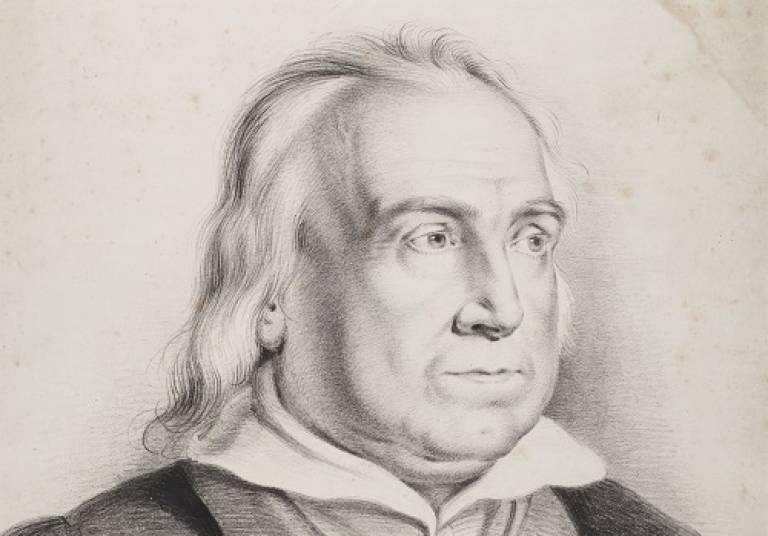Safe, seamless storage for a priceless resource
The Research Data Storage Service is bringing real benefits to a flagship project aiming to preserve and publicise the writings of one of Britain's most iconic philosophers

5 February 2016
Securely and cost-effectively, it is enabling the UCL Digital Media team to store thousands of digital documents as part of Transcribe Bentham, a double award-winning initiative that uses crowdsourcing to copy out previously unpublished and unstudied works by Jeremy Bentham (1748-1832).
As well as ensuring the documents are readily accessible for future researchers exploring the thoughts and times of this hugely influential figure, this easy-to-use service also has potential to help the UCL Digital Media team make their own suite of services even more attractive to internal and external customers.
Fresh thinking for a famous philosopher
Philosopher, reformer, visionary and spiritual father of UCL itself, Jeremy Bentham was undoubtedly pivotal in the evolution of political, social and economic thought - and his preserved skeleton and wax head remain one of UCL's most popular and offbeat attractions.
To secure his legacy in the digital age and maximise access to his corpus of work, Transcribe Bentham - part of the ongoing, UCL-led Bentham Project - has set itself the challenge of:
- producing digital images of thousands of his original manuscripts, speeches and other documents now held at UCL and the British Library
- making these images available for transcription by volunteers
- adding the transcripts (after editing) and the corresponding images to a comprehensive, searchable archive that will become a public resource.
In terms of 'making it happen', the UCL Digital Media team are a vital link in the chain. "It's our job to take digital photos of the manuscripts and then turn the raw data files that we produce into TIF files for UCL Library's digital archive and JPEG files for Transcribe Bentham's 'Transcription Desk' built on open-source systems," says Tony Slade, who heads up the team. "We're responsible for managing the images generated by the project and storing them securely, so that everyone involved can find them easily and future researchers can extract meaning from the data years and even decades from now."

One of many pages from the digitised collection of Jeremy Bentham's writing on Transcribe Bentham.
Building a more secure store
A key requirement facing the team was the need to pinpoint, if possible, a more secure, more reliable, less resource-hungry alternative to storing the raw data files and their metadata on, for example, external hard drives - which would make it impossible for other people to access the data directly and also make it hard to locate specific material in future as staff move on or retire. This meant the team was an ideal candidate to become one of the pilot users of the UCL Research Data Storage service.
The core aim of the service is to provide 'live' UCL research projects with large-scale, enterprise-grade storage, including outstanding data safety and rapid data access. Another key benefit is the elimination of the day-to-day burden of ensuring compliance with the stringent data management criteria stipulated by UCL and the UK Research Councils, as this forms part of the service. Plans are also in place to develop a sister service comprising a long-term archive for historic, non-'live' projects.
For Tony Slade's team, the decision to buy into the new offering has resulted in three distinct areas of benefit:
- Cost - while the service remains in its early-life phase it is free of charge, and a guarantee not to charge retrospectively makes it much easier for UCL Digital Media to plan ahead from a financial perspective, with no 'nasty surprises' lurking down the line.
- Confidence - the networked, built-for-purpose storage facility enables safe storage at two sites, with binding security guarantees in place as part of the team's agreement with RITS.
- Convenience - as well as excellent searchability and a simple, intuitive upload process for adding new files to the store, the service provides a permanent home for data and avoids the need to move it or rationalise it regularly. It also frees up resources for the team by eradicating the need to maintain hardware, write to removable media, disks and devices, and then store and manage these.
"Another big plus point is that we can package this service into our team's offering," says Tony. "We can integrate it into potential revenue-generating digitisation services we provide to museums, the NHS, overseas universities and a whole range of other external customers."
Safeguarded for the future
" The Research Data Storage Service is just another great example of the real value RITS can add to research projects and the work of all kinds of teams here at UCL. -Tony Slade, Head of UCL Digital Media
The material processed as part of Transcribe Bentham constitutes a fascinating - and sometimes surprising - resource. What has become clear is not just its philosophical and political but also its cultural significance, providing extraordinary insights, for instance, into the eating habits of a different era thanks to Jeremy Bentham's habit of noting down recipes in his writings. The safe and secure storage of all this material in digital format is therefore hugely significant and helpful not just from an internal UCL operational perspective but also from a much wider academic and historical viewpoint.
"We've worked with RITS since their inception," Tony Slade comments. "This is just another great example of the real value they, as IT specialists, can add to research projects and the work of all kinds of teams here at UCL."
Let us leave the last word with Jeremy Bentham himself. Famously, he once asserted that "the greatest happiness of the greatest number is the measure of right and wrong". In that spirit, we hope that the Research Data Storage Service is set to do its bit in making a lot of researchers a little bit happier.
 Close
Close

